#every appearance and aspect of their characters to a significant degree
Note
Whenever I think of Mario and Luigi's characters and personality I think of your interpretations and depictions of them, because yours are so objectively correct
YAYYY THANK YOU :-]
#1 rule is to always remember MARIO PROFILE

tbh the thing about them is like with luigi is you can say almost literally whatever you want about him and it will probably be backed up by canon to some degree. and with mario you can say almost literally whatever you want about him and there will probably be no way to disprove it. so most claims that aren't like totally outlandish are usually fair game LOL. i'm glad you agree with how i interpret them though :-]
#ask tag#talk tag#i think i've just said so many things about them over the years i've been on this site that people like#think my takes are more nuanced than they are#which like don't get me wrong#i talk about mario and luigi all the time because i do love them and consider like#every appearance and aspect of their characters to a significant degree#BUT it's just harder to say something wrong with them vs a lot of other characters LMFAO#it's just that when characters have like a few core defining/well known traits and you say like#'hey yknow mario is more than an endlessly cheerful guy who goes wahoo and yippee 24/7 and luigi isnt just a shy sad scaredboy all the time#it's like yo...that's so real actually. which is fair because mario and luigi arent exactly characters made to be deep or thought provoking#but that doesnt stop MEEEEEE :3
20 notes
·
View notes
Note
What are the four factor of regeneration, exactly?
Four Factors of Regeneration
1️⃣The Core Being/Foundational DNA
Each Gallifreyan pops into the universe with shiny, new triple helix DNA formed from either a template or biological parents, setting the stage for their core physical and personality traits.
Although the DNA will change and dominant/recessive alleles will remix themselves to change up physical appearance, psychologically each body is just emphasising a different aspect of that original core personality, like the same song with the lyrics in a different order.
Additionally, some core physical and psychological characteristics will just 'stick' throughout many incarnations.
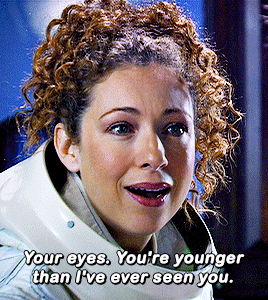
2️⃣Skill Level
Regeneration is an art, and not every Gallifreyan is Van Gogh. While some will create a masterpiece every time they try, others need centuries of practice, and a few might never learn how to pick up a brush. The higher the level of skill, the greater the control, and the smoother the transition.
Especially in the case of the unskilled, bodies can and will rely on ‘what it knows’. For example, if you’re an unskilled Gallifreyan who has been inhabiting bodies that are continuously male, chances are the regenerative process will generally stick to that format because it’s familiar, and significantly lowers the risk of regeneration abnormalities or severity of post-regeneration sickness, like choosing the same character in a video game because you know how to play it.
3️⃣Environmental Vibes
Where you regenerate is as important as how. A calm, supportive environment, like a TARDIS Zero Room, can make a significant difference, offering stability and aid. Regenerating while your companion is having a meltdown and you're crying cos you don't want to be Peter Capaldi, on the other hand? Not really ideal for focus.
As a rule of thumb, regenerating bodies try to adapt as best they can to the environment it’s in. Ergo, if you regenerate in space, your body may just try to adapt to living in a void ... 🫠
This category also includes other influencing factors like drugs and radiation - the presence of certain hormones or biochemical agents in the body at the time of regeneration could influence the process.
4️⃣Random selection
Even taking all of these factors into account, there is still a degree of random selection, as in humans. Some things (are your earlobes attached? Can you roll your tongue? Do you like pears?) can be truly random.
Hope that helped! 😃
→🫀Gallifreyan Anatomy and Physiology Guide (WIP)
→⚕️Gallifreyan Emergency Medicine/Monitoring Guides
→📝Source list (WIP)
-------------------------------------------------------
》📫Got a question / submission?
》😆Jokes |🫀Biology |🗨️Language |🕰️Throwbacks |🤓Facts
》📚Complete list of Q+A
》📜Masterpost
If you like what GIL does, please consider buying a coffee to help keep our exhausted human conscious for future projects, including complete biology and language guides.
#doctor who#gil#gallifrey institute for learning#dr who#dw eu#gallifrey#gallifreyan biology#gil biology#gallifreyans#ask answered#libragendertimelord
42 notes
·
View notes
Text
It doesn't really matter whether Jason uses guns or not. People are compressing the complexity of his narrative significance by making it out to be about whether Jason uses a crowbar or guns or whatever. His character isn't centered on his choice of weapon. He is skilled in pretty much every weapon. The question that the discussion about his choice of weapons is trying to pose is, "can he play judge, jury and executioner?"
But maybe he isn't playing that game anymore. Maybe he is past the dress-up and roleplay game, the costumes, the gimmicks. Jason is a disillusioned character in a medium, comics, held up by a collective illusion. The readers and the characters believe in the game, but Jason doesn't anymore. How can you try to convey that through flattening the issue to be about gun use? Jason is the character trying to tear apart the cyclical narrative of the comic, but the comic is also what is holding him together. He fell apart and died and only the medium could patch him up again and now he struggles against it and what it means for the city he loves. And you still want to talk about whether he uses guns or a crowbar? It never mattered. He uses the tools he has. He will struggle against the narrative constrainsts, the hand of the author holding him down and pushing him into form. He will grab what tool he is given and if those are guns or swords, it ultimately doesn't matter. At his core Jason is about two things: caring. And cold rationality. But since Bruce Wayne is the ultimate hero of these stories, always to some degree the focal character, the constant standard to hold Jason up to, Jason will always appear to fall short of the ideal. As his own character he is made up purely of heroic values, but by being a narrative foil to Bruce, certain aspects of his character are distorted, forced in or out of focus. And yes, one of those being his use of guns, which goes against Bruce's idealogy about them. The matter of guns vs. no guns does not matter to Jason, it only matters to the reader, but it is not what he is about. Not the guns, not the killing, just the deep, desperate love for his city and it's fellow victims and the futile struggle against the cyclical nature of the narrative and the hopeless pain it brings again and again.
#jason todd#meta#dc comics#dc#red hood#batman#bruce wayne#batfam#rant#but I have a point here#yes jason being about caring and cold rationality are seemingly conflicting aspects#they dont necessarily conflict but also jason is a character with inner conflict ok?
174 notes
·
View notes
Text
Fairytales - All of us are our own Prince Charming
A few years ago, I attended this workshop about storytelling and the ancient legends of Great Britain (where I live), and the host said that as a society we are suffering from a ‘crisis of metaphor’. What he meant was that we tend to take things too literally and therefore miss symbolic significance.
An area where I see this happen over and over again is our interpretation of fairytales - namely, this idea of a princess being saved by a prince, and the modern notion that it teaches little girls they need a man to rescue them.
This is valid, but only because we fail to teach little girls (and boys!) the true meaning of such tales. In fact, the most well-known fairytales date back not just centuries but millennia, because they contain elements of older myths. For instance, the three fairy godmothers in Sleeping Beauty are the three fates found in Norse and Greek mythology - who also appear as the three witches in Macbeth. The notion of an apple of temptation in Snow White, too, has its origins in ancient Greek legend - not to speak of its allusion to the Garden of Eden.
The reason such tales have persisted in popular culture for so long is that they speak to something deep inside us, and this goes well beyond just promoting the idea of a girl needing a man to save her. For this reason, there are books out there psychoanalysing classic tales as if they were dreams, from both a Freudian and a Jungian perspective. We also got taught to analyse stories in this manner in my English degree, once upon a time.
As a brief example, I’ll return to Sleeping Beauty. As a little girl, she's hidden away and protected from all eyes, especially men’s eyes, as if trying to keep her young forever. Her parents refuse to allow her to touch that magic spindle, which is a symbol for puberty and awakening sexuality. I mean...a needle, and a bloom of blood?? However, this growth is inevitable. Despite how much they try to keep her from being exposed to the outside world, Aurora finds the spindle anyway and falls into a deep sleep.
This sleep not only affects her but the whole kingdom. Everyone goes unconscious, other than the witch / dragon. The prince then has to fight through thorns to reach the princess and defeat the dragon. A crucial question is: why would he do this? Surely there are easier princesses to win! And if we look at the Disney rendition, he literally just saw Aurora talking to squirrels and owls and immediately fell in love with her, instead of thinking she was a bit odd. All of this tells us we can’t take it literally.
The dragon and thorns are the internal defensive measures to try to keep out the prince, who represents everything that was being repressed - the awakening moment that will bring Aurora into the adult world the parents and fairies were so keen to hold her back from. In this sense, we can say that the witch and the prince are both other aspects of the princess. In other words, there is no girl in need of saving by a man. The man is part of the young woman. She is saving herself. There is no kiss to wake her up magically - this is symbolic of her emotional awakening and transition into adulthood. This is why she is named Aurora, a reference to the dawn.
We can look at every popular fairytale in this way and see that each character is an archetype. Each of us, male or female, holds all these archetypes within us. So, fairytales are not merely stories but ways of symbolically exploring growth experiences and journeys we all go through. In this way, even a little boy hearing one of these tales can relate to the princess. Every boy is the princess and prince - every girl is the princess and prince.
What is key is making sure that the symbolism is strong. Don’t explain all of this to young kids and ruin the magic. But as our children grow and begin to be aware of the symbols, we can explore it with them and teach them that each and every one of them has the power within to be their own Prince Charming and free themselves from any 'evil spell'.
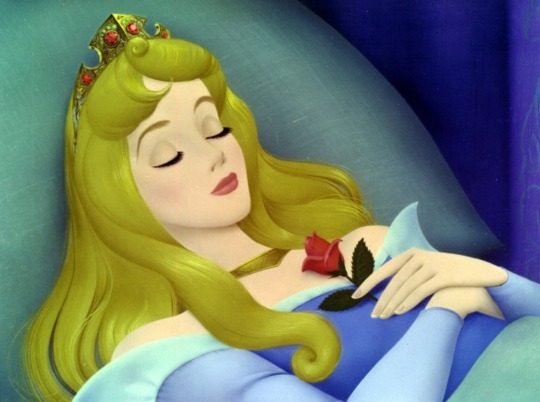
#fairy tales#fairytale analysis#fairytale meta#sleeping beauty#sleeping beauty analysis#jungian#archetypes#Freudian#symbolism#myths#prince charming
20 notes
·
View notes
Note
I'm gonna be an absolute bastard and ask you all 19 questions for that OC creation ask thingy.
what was the first element of your oc that you remember considering (name, appearance, backstory, etc.)? This one is all dependent on what world I'm creating in. The world itself is my first consideration because of how much itll effect a character, even if Im remaking Uthorim he will be made from the ground up to fit the world. after that its a mix of name and backstory. the appearance shifts and morphs as theyre made.
Did you design them with any other characters/OCs from their universe in mind? This one entirely depends. I will put side characters into backstory but whether or not theyre used again just depends. I usually tend to let what characters/OCs they interact with be entirely open.
How did you choose their name? Slowly and painfully. I take a lot of time choosing names and they have to not only fit their story but sound good said aloud.
In developing their backstory, what elements of the world they live in played the most influential parts? Truely all of them. The world itself has to be ingrained into the character whole heartedly. I do not like a character that feels out of place in the space theyre playing in.
Is there any significance behind their hair color? Honestly no. the only time I consider hair color as a story beat is if the character is changed by a magical or alchemical mean.
Is there any significance behind their eye color? This one will have a bit more thought put behind it. I always looks way to deep into eye color. shout out to baph making Angelus eye color gray, Before looking at them in depth for fallout 4 companions i thought it was gray it fits them really well! Uths eye color for instance being a bright bright blue was chosen to signify how otherworldly he is at heart. Magic courses through his veins to a high degree.
Is there a significance behind their height? Not really, It just depends on the vibe i wanna give off. Im 6,3 irl so i tend to lean toward tall characters but its not exclusive.
What (if anything) do you relate to within their character/backstory? Oh everything, every character has a bit of me in it. every single time, it just depends on who youre asking about!
Are they based off you, in some way? 100% they always have something like I said above, its just apart of my process. Uth is my hope and protection, Abaddon is my anger, Finn my loneliness and confusion.
If they have a LI, how much of their character is tailored to be compatible with that person? Umm I dont usually write spouses/love interests from the get go. I would say not at all, I dont see love as this thing you can manufacture necessarily but more of a thing that just feels right. Uth/Lo was never on my radar when making Uth. They just kinda fell mouth first onto each other and Ive been hooked ever since. I let the door hang open when it comes to relationships. Every pairing is possible in my mind.
Did you know what your Ocs sexuality at the time of creation? Not exactly, I dont think about it to hard at the start. its something that comes as theyre written and played. I just go "Oh I guess this is how they feel!" alot.
What have you found to be the most difficult about creating art for your OC? consistency is a big one. I tend to write when the vibes are vibing and so I have to go back later to make it fit more smoothly. Other than that is physical description, I rely heavily on character creators to put them into physical form.
How far past canon events that take place in their world have you extended their story, if at all? Give me enough time with an Oc and Ill tell you their dying words! I think about every aspect of their life.
If you had to narrow it down to just 2 things you MUST keep in mind while working with your OC, what would they be? Vibe and Attitude. They have to fit those two things, whatever they may be, that I set for them.
What is something about your OC that makes you laugh? The lengths theyre willing to go for someone. I mean in any direction. It leads to all kinds of shenanigans.
What is something that makes you cry about your OC? How willing they are to sacrifice themselves they are. They see a version of the world in which they live but dont believe theyll see it.
Is there some element that you regret adding to your OC or their story? Not that I can think of tbh. Everything I put in is a deliberate choice. Even if it doesnt feel the great to write about or mention from a moral standpoint it all has a purpose.
What is the most recent thing you discovered about your OC? That they all are coming to terms with feeling "Negative" emotions and that they dont make them bad people for feeling them.
What is your favorite fact about your OC? That I get to put them next to my friends OCs and play dollhouse! <3
2 notes
·
View notes
Text
Jessica cruz vs darkseid

#JESSICA CRUZ VS DARKSEID TV#
So, this was a great way to be introduced to her as a character and to understand her struggles. Admittedly, I didn’t know much about Jessica Cruz, her back story, or what her struggles with the Green Lantern ring were like. They also announced that they will have a Green Lantern’s run with Simon Baz and Jessica Cruz, and that only excited me even more. Once they announced Rebirth, I was excited to see the characters I love in this universe have a new and fresh take. So, for that, I thank Geoff Johns for introducing this character to the DC universe. So, as I related to his struggles in significant ways, the experience made this universe even more precious to me as I felt like I fitted in. It’s a trait that I continually struggle with to this day even as I wrote this. And I felt that maybe I was not good enough. I used to be someone who was confident and had so much belief in herself, but then I hit a period in my life in which it all changed. He does have the strong will and power to embrace the ring and the Green Lantern, but one reoccurring theme is his self-doubt. This is also present in Green Lanterns Rebirth. Reading this graphic novel also showed the torture aspect of detainees and highlighted the issues that surround that.īut most importantly, the character trait that really stood out to me was the self-doubt he had and how he didn’t think he had it in him to be a Green Lantern. It’s a fear that many Muslims have: walking among society living with the fear that you don’t belong and having a share of the blame for attacks and horrible things done by a few. I saw how he struggled with being framed as a terrorist, and to a degree, I understood what that felt like. I instantly became attached to the character. The first time Simon Baz appeared in the DC universe was in 2012’s Green Lantern run in the Rise of the Third Army arc. But this got me into countless hours of research because it was important for me to see someone I can relate to in a comic universe that I treasured with every ounce of my being. At that point, I had never even heard of him due to the lack of my comic book knowledge. One day, I opened my messages and someone had messaged me about Simon Baz and asked what I felt about him being a British Muslim Arab. This need led me to tumblr, which was a great place to find a community who enjoyed and had great passion for the DC superheroes that I fervently loved. I found myself wanting a community to share these interests, and I wanted to know more to be able to discuss all things DC with people who also were as passionate about these characters as I am. How could someone still fight the good fight and embrace the tragedy that fell upon him as a child and still sacrifice more and more every day? I loved how all of these characters sacrificed everything to make the world a better place.
#JESSICA CRUZ VS DARKSEID TV#
With superheroes, it was mostly the animated TV shows and the movies. She's in justice league rebirth too.I am a British, Muslim Arab girl, and I’ve loved superheroes and all things Sci-Fi and geeky for a long time. (Also usually on reddit i see people praising it a lot, but only the latter part of the book which abnett wrote)Īfter that you can jump to green lantern future state which has a back-up for Jessica which leads into the yellow lantern annual. You can read green lanterns rebirth and justice league odyssey. Her origin is in darkseid war but it's johns writing her is pretty meh imo. One of the books which made me love the character. Is that in any collection at all? What other TPBs feature Jessica if I wanted to dig more into her character? Wasn't there a GL run featuring her and Simon Baz? And now I'm reading something like she has a new origin from Darkseid War? Or is that just her GL origin?Jlo is amazing jessica cruz content. Then here I see the Annual where she joins the Yellow Lanterns. All I could really find before checking here were references to the YT book and JLO (which I remember reading comments at the time saying it wasn't a good representation of her). I'm looking for some good Jessica Cruz stories post-Forever Evil.

0 notes
Text
Perfect Guide To Finding A Hair Salon

Many people have a certain image that they have in mind when they are styling their hair. It can be done in a variety of styles, textures, colors and styles. But, somewhere in the bowels of there is the worry of never being able find the ideal salon that can pamper your hair exactly as you'd like. Your hair is among the most well-taken care of parts of our body. One bad hair day can ruin the whole state of mind of a person. On the other hand an excellent hair day can invoke feelings of joy as well as confidence and confidence for the individual.
Here are some step-by-step guides to help you choose the perfect hair salon:
Check that the salon is up to current with fashion trends.
Similar to hairdressing, it is an ever-changing and evolving profession. The world of fashion is marked by rapid change and advancement of styles and techniques. Every other day an innovative product or hairstyle gets popularized.
Your hair is not to be used for any kind of experiment. Also, you should ensure that the hairdresser you choose has the most recent fashions in the mind. A professional hairdresser must be able to produce some evidence from his work to prove his effectiveness and knowledge of current fashions.
Salon staff are highly trained and professional.
Each person's hair is an integral aspect of their character. Hairstyles can make or break a person's overall appearance. Men and women are more aware of their hairstyles. Don't place your precious hair in the hands of an amateur hairdresser.
It is vital to be aware of the credentials and experience of the hairdresser to ensure the competency of the person. Before signing an Perm hair salon near me, ensure that the hairdresser has an accredited degree from an accredited school in barbering and hairdressing. You can ask them to show you the previous work.
youtube
Make sure the hair salon is clean and well-maintained.
A hair salon provides its services to a large number of customers every day. Each person visits a hair salon to avail a variety of hair-related services, such as haircuts or a trendy hairstyle that is stud. It is a place where people can relax and pamper themselves. But a person cannot unwind in a space that has a smudge of hair from another person's on the floor or in the towel used for drying. Therefore, no matter how skilled the hairdresser and how experienced they are, you must make sure the salon is cleaned.
Location plays a significant part in the process.
The location of the salon speaks volumes about the owner's ideology, the type of clients they hope to attract, and the high-quality of the services it offers.
The place of the hair salon is a crucial factor while choosing a hairdresser. A hair salon should be within walking distance of the client so that you don't need to travel far to get your hair cut. In our busy lives, we don't have the time, or the desire to drive for an hour to get our hair done.
Find out the price.
As attractive as the glitzy interiors, latest technology, and experienced hairdressers are, they all come at an expense. A well-maintained salon is expensive as are the services they provide. Coloring your hair or hair extensions, or simply getting your hair styled may cost more than you can imagine when offered by experienced hair stylists at luxurious salons.
Prior to choosing the right Korean hair salon ensure that it doesn't weigh too burdensome on your wallet. Although everyone loves pampering, it shouldn't come with a price you'll regret later. Choose the right salon for your budget.
Recommendations and referrals can make a huge differences.
A recommendation is one of the most reliable sources for picking the Korean men's perm that meets your expectations and needs. Ask your friends or family for their reviews or use social media to read the opinions of other customers. If you are inspired by their hairstyles, you can ask them to recommend a salon or stylist. You can't go wrong with a recommendation from your family or friends regarding the salon they go to.
0 notes
Text
Jon Snow - Romantic or Platonic Relationships
YGRITTE “JON LOVED A MAID WITH FIRE IN HER HAIR”
The first love isn’t always the most significant in one’s life or the one who lasts the longest, but still it’s the one people will always remember. For Jon his first love (and so far his only book!canon) is Ygritte. I won’t pretend that everything about their relationship was sunshine and rainbows and there are some aspects of their relationship that I don’t particularly like. However, I decided to focus on the positive stuff of their love in this meta.
In many fantasy books when the main character finds a love interest she will either be equally important to the plot (which wasn’t the case for JonxYgritte) or if she’s a secondary character only relevant to his own story (Jon x Ygritte fall into that category)she will be a “trophy wife” aka the prettiest girl, the most skillful warrior woman and/or having great inheritance. I’m glad that Martin didn’t follow that route and made Ygritte an ordinary girl by Wilding standards (the only “extraordinary pretty” thing about her by wilding standards are her “kissed by fire” hair, but by westerosi standards her tangled hair isn’t exactly a standard of beauty).
Here is the first description of Ygritte, not exactly the conventional beauty I’d say(and before someone says that Jon prefers wild girls over conventional ones, I know. I just wanted to point out that he doesn’t find her pretty from their first encounter, unlike how he described Val’s undeniable beauty from their first meeting):
Ygritte watched and said nothing. She was older than he'd thought at first, Jon realized; maybe as old as twenty, but short for her age, bandy-legged, with a round face, small hands, and a pug nose. Her shaggy mop of red hair stuck out in all directions. She looked plump as she crouched there, but most of that was layers of fur and wool and leather. Underneath all that she could be as skinny as Arya.
But for me it’s even more sweet that as Jon slowly falls for Ygritte he starts to find aspects of hers (both in terms of appearance and personality) endearing.
At a lord's court the girl would never have been considered anything but common, he knew. She had a round peasant face, a pug nose, and slightly crooked teeth, and her eyes were too far apart. Jon had noticed all that the first time he'd seen her, when his dirk had been at her throat. Lately, though, he was noticing some other things. When she grinned, the crooked teeth didn't seem to matter. And maybe her eyes were too far apart, but they were a pretty blue-grey color, and lively as any eyes he knew. Sometimes she sang in a low husky voice that stirred him. And sometimes by the cookfire when she sat hugging her knees with the flames waking echoes in her red hair, and looked at him, just smiling . . . well, that stirred some things as well.
He starts to love her smile, her lively eyes, her low husky voice and just her overall presence. Jon is in love even if he hadn’t fully realized that at that moment.
Ygritte’s most famous phrase “ You know nothing, Jon Snow” is overused both by the tv!show and the fandom when they want to make fun of Jon. But in context it isn’t that bad. In fact, it’s true that in certain aspects, like the life Beyond the Wall, Jon was really clueless before he lived with them. Nowhere in the text Martin implies that Ygritte is more clever and knowledgable than Jon in every aspect. He had a Lord’s son education and knows plenty of things about Westerosi society while Ygritte knows about the Free Folk and the lore beyond the Wall. Each one of them could learn things from the other but because we are in Jon’s head we often see Ygritte teaching him new stuff about the Free Folk’s way of life and not the other way around.
In my opinion, I find it endearing that Jon even after Ygritte has been long dead he remembers that phrase of hers and repeats it in his head. Not only show humility but it also takes a certain degree of wisdom to admit that you are ignorant about a lot of stuff (which reminds me of my classical studies and a favourite quote by philosopher Socrates “ The only true wisdom is in knowing you know nothing”)
Finally, I want to highlight Ygritte’s importance in further shaping Jon’s taste in women. From his ADWD chapters we know that Jon likes girls who take action in their hands - and preferably fight,too- instead of those who are waiting to be saved. Ygritte was the first woman he met who was a warrior herself (Arya was also fierce but she was a child the last time he saw her, not a woman yet) and Ygritte was also his first love. So, I do believe she further influenced his preferances in women.
59 notes
·
View notes
Text
Fushiguro Megumi: the protector
One of the things that makes jjk very interesting is how Gege writes the characters in a way that freed them from a number of stereotypes usually found in shonen manga in relation to how their appearance are. And that makes the character in this manga feels more layered. One of the example is our deuteragonist himself, Fushiguro Megumi.
Fushiguro is one of characters that make you thought of certain stereotype - but as the story progresses and his character is explored more, he is actually different from the stereotype of dark brooding rival of the protagonist his appearance is based of.

On his first appearance, Fushiguro is shown to be someone serious, seemingly a stickler for rules and formality, as he speaks in honorifics to Gojo in the phone -- even if it’s him saying that he will punch Gojo. When he speaks to Gojo, there’s a strange mix of formality and familiarity, which is a given considering their long history.

He even cites the law of jujutsu for the reasoning of Itadori’s execution right after Sukuna incarnates even though Itadori eats the finger because he is also trying to save Fushiguro. However once Gojo appears and asks what he should do to Itadori, his answer is right on the opposite direction.
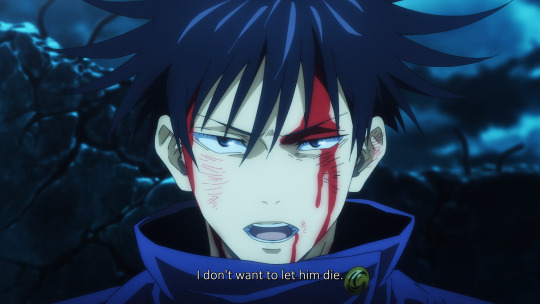
And from this point on, we know that he is never ‘just a simple rival’.
1. Not even a rival
Itadori and Fushiguro’s dynamic is one of the focal point that drives the story of jjk, among others.
but who’s to say that someone you save won’t kill anyone in the future?
Fushiguro and Itadori share the same fixation on saving people. While Itadori wants to give “proper death”, or save as many people as he can from curses, Fushiguro rather listens to his own conscience, where he want to give good people what they deserve. And this believe of his rooted from the ‘undeserving’ situation he feels is granted to his sister in this life. This different ideals made the two of them clash during Cursed womb arc, but they settles their difference pretty quickly out of respect for each other, and this connects the two of them closer than them to other characters.
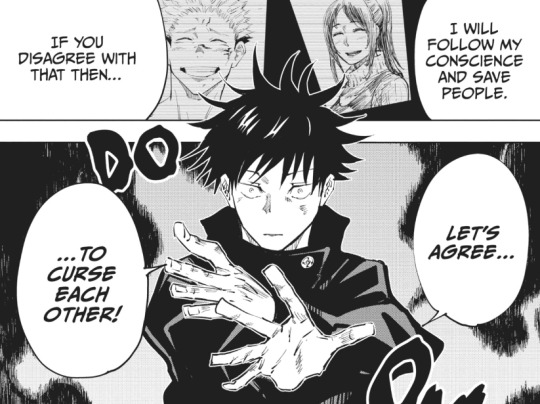
For Fushiguro, Itadori has become someone as important as Tsumiki despite only knowing him for a short time - and likewise, Itadori also thought Fushiguro as important. Fushiguro, in addition, also feels that he bears the responsibility of keeping Itadori alive and shoulders the consequence of every action Itadori and Sukuna does, since Itadori consumed Sukuna to help him in the first place. That is the reason his first fight with Sukuna happens after all; him staying behind out of feeling responsible.

And this responsibility develop into the necessity to protect Itadori, both from literal harm (the Kyoto students trying to assassinate him) and from metaphorical one. Likewise, Itadori not telling Fushiguro what Sukuna told him is also to protect Fushiguro from the guilt that will consequently arise.
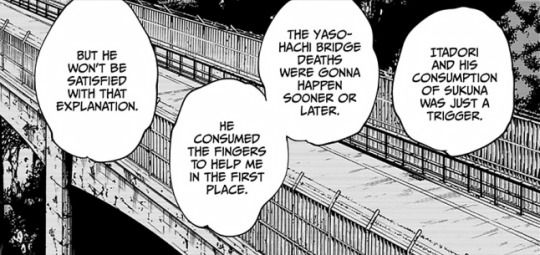

While there is a bit of rivalry, it doesn’t become something that the two of them fixated on. It does feed on their growth, but this rivalry mostly takes a backseat - it will, when he lives in a world where everything, even the authority, is trying to kill his closest friend and someone he is trying hard to protect.
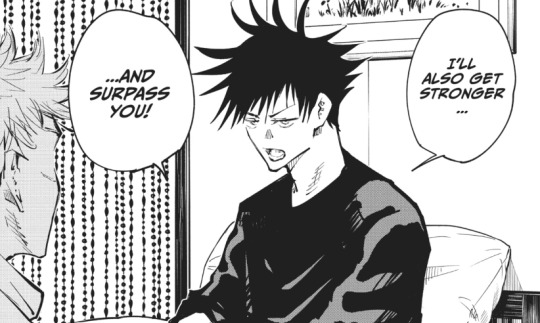
2. To die or not to die
Fushiguro’s nature as a protector is rooted in his personality. Because of his upbringing and precociousness, he has his own view of what he think to be ‘good’ and ‘bad' that is very personal to him.
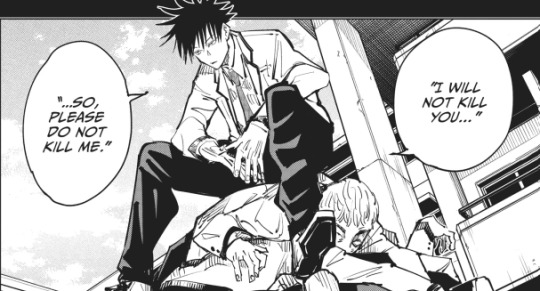


Fushiguro has certain degree ‘sense of justice’ based on his notion. During this flashback, he picks fight with the delinquents not because they attacks him personally and not because anyone asks him for help, but just because he thought that they are wrong in bullying their classmates.
At first he is not inclined to be a jujutsushi because saving people doesn’t fit into that notion of his. The work of a jujutsushi is in its heart is to save people and it’s tailored for not only the one who has the ability, but also the compassion to do it. Something that is unthinkable for junior high Fushiguro.


It’s Tsumiki’s curse that change Fushiguro. He is started to driven to save people like Tsumiki. And also, if there is someone that can solve the case of Tsumiki’s curse, it will be a jujutsushi.
He feels that a lot of people he thought to be ‘good’ given unfairness in life. Like his sister who was cursed and fallen into coma, and Itadori who ate Sukuna then received death penalty.

I will save people unequally!
His personal sense of justice drives Megumi to help and save them in his own brand of heroism stemmed from his ego of choosing who’ll he save and who won’t. ‘Good people’ affects Fushiguro deeply that out of respect for Itadori who had died, he does something that usually he doesn’t do.

While he sees both his sister and Itadori to be the same good kind, he judges himself to be different from them and he doesn’t care if he is ‘not right’. He doesn’t feel that he deserves the salvation as deserved by ‘good people’ and this reflects mainly in his... um... suicidal, sacrificial tendency.
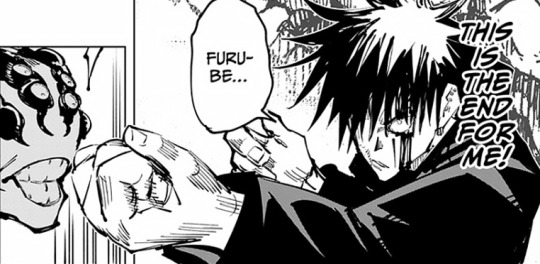
Every single time he is cornered in battle, he used to resort to summoning Makora - which essentially means he will die. He doesn’t think that his death is matter at all for anyone else as long as his purpose in winning the fight is fulfilled - which actually not necessarily true.

It’s a good thing that after his training with Gojo, Megumi starts to realize the importance of him not resorting to ‘winning by dying’. This point in Shibuya actually marks a significant development of his character - even if he still summon Makora after.

3. Blood does not necessarily run thicker
One of the most surprising aspect of Fushiguro is how he readily discarded the identity that comes with his bloodline. A contrast from Kamo and a point that makes their clash during Goodwill event arc very interesting. For Kamo whose mother left him so she doesn’t get in his way to be the family heir, the way Fushiguro easily deny his bloodline of course offends him highly -- it’s almost like Fushiguro does not care about his mother’s sacrifice.
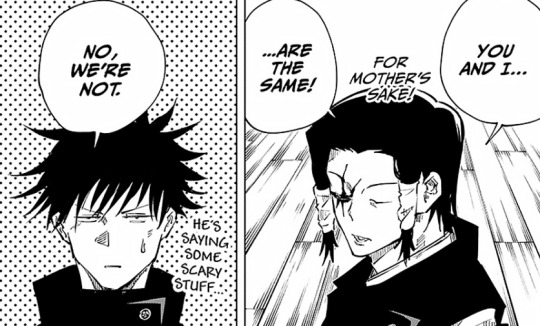
Well, it is understandable that he deny his bloodline. Regardless that the tradition of the Three Great Families just reek of shit, Fushiguro never experiences normal blood-related family bond since he was born. Everyone who should be his family based on blood never give him the bond other people experience. His biological mother had died, his father left him (and died unknowingly), Tsumiki’s mother also left the siblings. The one who took care of him was Tsumiki and Gojo to an extent, both of whom has no blood relation to him. Gojo even bought him from the Zen’in. And the Zen’in who is supposed to be his blood-related family trade him off easily with money, so it is understandable if he does not feel a strong bond with his own bloodline.
This is ironically (but in a positive way) very contrast with Fushiguro’s technique; Ten shadows jutsu. One of Zen’in’s most prized inherited technique is manifested by Fushiguro who deny his blood and passed down by his father who the family refused to acknowledge as one of their own. The technique that also made Fushiguro coveted by the head family that they readily forked over 10 million for him. It’s a very ridiculous situation.

4. Next ‘strongest sorcerer’
The growth of a jujutsushi is never easy.
Fushiguro’s growth as a jujutsushi is a difficult matter, way more than Yuuji. Compared to Fushiguro who is already familiar with jujutsu from a very young age, Yuuji is like a child whose growth is still in exponential phase. Since his main weapon is his cursed technique, Fushiguro’s growth as the more settled jujutsushi in this case should mainly come from inside himself. But it’s been a rocky way for him.

First, his mindset is working against his growth -- because he has Makora to rely on, he tends to summon it readily than try to explore his technique more. Then as fundamentally Fushiguro is someone compassionate, he puts cooperating and matching his level to people around him first -- which actually hindered his growth of ability, because his nature as jujutsushi is on the opposite side.

As a jujutsushi, Fushiguro’s nature is the same as Gojo and Sukuna; a lone wolf who is the strongest on combat when he is alone. Gojo even implied once that Megumi’s cursed technique has the potential to be on par -- even beat his.

With not one, but two strongest jujutsu users invested in Fushiguro’s growth, I think it’s not an overstatement to say that he will be an incredible jujutsushi in the future -- if his growth does not fail him. And going by the current story development, it is more required out of Megumi to be stronger than ever, both as the person that he is and as jujutsushi.
5. The future is as uncertain as ever
Now that Gojo is gone, the burden Megumi shoulders will be exponentially rising. More than to stabilize Tokyo back, it is the responsibility that he always feel over of keeping Yuuji as Sukuna’s vessel alive that probably will demand a lot out of Megumi. In addition to losing Gojo and the waking of Tsumiki as one of the Brain’s victims, Megumi needs all the strength he can muster, literally and figuratively, to be able to survive the coming of near future -- even though ironically he is one that is readily dying anytime.

694 notes
·
View notes
Text
02′s influence on Adventure
You’re probably reading the title and going “...what? Isn’t 02 the sequel to Adventure? How would a series be influenced by its own future sequel?”
The thing is, assuming that Adventure was written in a vacuum and everything in 02 a retrofit runs very contrary to how both series were produced, and how this kind of anime is produced in general -- Adventure and 02 share almost identical staff members, and were separated only by a real-life single week in airing time. 02′s existence was not a sudden last-minute decision that was tacked on at the end! In fact, Adventure being extended to a second series was decided seven months into its production, right around the end of the Tokyo arc (sometime around the third cour). Despite it being a rather tonally different series, 02 is really just Adventure’s staff...writing more.
This means that by the time production had moved to Adventure’s final arc, the staff was very aware that they would be on for another year writing a sequel to this anime -- which thus likely became the fuel behind many of its creative decisions, made specifically to pave the way for 02.
The ending
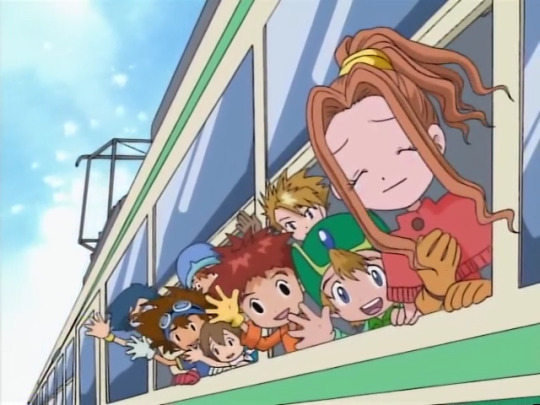
Yeah, so, this ending. You know this really famous ending? The one that’s had such an impact on franchise history that a lot of later things have even tried to imitate it in some form? The one that everyone cites as one of Adventure’s most famous scenes (for good reason)? This ending only exists because of 02. You know what actually would have been Adventure’s ending if 02 hadn’t existed?
The 02 epilogue.
The ending that we now know as the “02 epilogue” was actually decided on before recording for Adventure had even started. (They weren’t even sure about finalizing the character personalities yet!) All of the most substantial details about that epilogue -- the series actually being the adult Takeru’s novel, everyone in the world having a Digimon partner, and, as it seems, even Yamato and Sora getting married -- were decided on before 02 was even in the picture. Most likely, the only material difference would have been that the four characters introduced in 02 (Daisuke, Miyako, Iori, and Ken) and their partners wouldn’t have been involved, but everything else would have roughly been the same as the “epilogue” we know now. (This especially makes sense when you consider that one of Adventure’s major influences was the movie Stand By Me, which is extremely culturally influential in Japan as a “childhood summer adventure story”, and involves a similar timeskip epilogue with one character growing up to chronicle the story as a writer.) All of this was basically intended to tie into Adventure as a narrative of “a story of humanity’s evolution”, so this ending was envisioned as the “natural conclusion” of the story of Adventure as a whole. If anything from the original Adventure ending would have been retained in this hypothetical scenario of only Adventure existing, perhaps the sentiment of “parting” at the end -- but then it would still be followed by a timeskip epilogue 28 years later and everyone in the world having a partner.
But then it was decided that a second series would be made, and at some point they decided it would be a series set three years after the first, resulting in: this.
What this means is that Adventure’s ending was only ever intended as an ending for a single chapter in the overall Adventure series narrative. A lot of people like to pose 02′s existence or epilogue as something that “undid” Adventure’s ending, as if it was supposed to be some “ambiguous bittersweet” ending about whether they ever met their partners again, but...that ignores the real-life context of Adventure and 02′s production, where Our War Game! (which depicted an easy reunion with their partners, went out of its way to cameo Miyako in advance, and, for all intents and purposes, practically spoiled Adventure’s ending by depicting them as separated at all) screened before Adventure’s last episode aired, and there’s also the Adventure mini dramas that depicted more incidental meetings (and despite the constant fourth wall breaking and absurd crack content in them, yes, they’re intended to be taken as canon).
Again: in real life, the first episode of 02 aired one week after the last episode of Adventure. Even the real-life audience was likely well aware that this wasn’t going to be the end (and if they weren’t, they certainly would be when the promotional trailers for 02 started airing right after Adventure’s last -- and that’s assuming you missed all of the promotion appearing in real life beforehand, including at the end of Our War Game!’s screenings). The production staff all knew, because they’d already been working on 02 for months now -- they postponed their originally intended ending just to make this new one, after all!
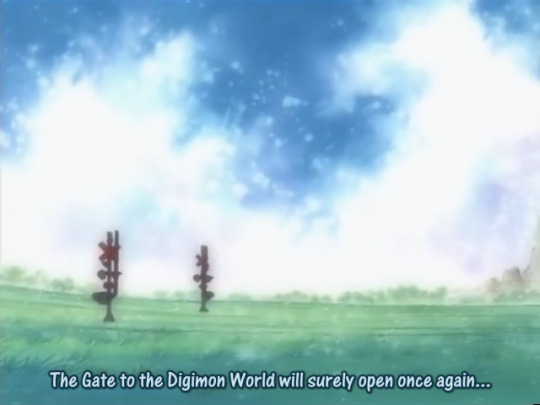
So yeah, this line isn’t supposed to be just a vague “oh, maybe they’ll meet again” in an abstract poetic sense -- it’s completely literal, because it’s hinting at said gate opening again one real-life week later.
From both a story perspective and a real-life audience perspective, this ending was never meant to be seen as ambiguous.
Takeru and Hikari’s character arcs
02 often gets an accusation of being lacking in the character development department (one that I seriously disagree with and have been working very hard to counter), but this accusation especially gets levied often at Takeru and Hikari, who are often said to be “flat” or “kind of just there” in 02 (which, again, I object to; more on this below). This is often rationalized as a theory that the writers didn’t know what to do with them because they’d already been in Adventure, but...this, again, assumes too much that Adventure was written in a self-contained vacuum and anything in 02 was just an addition done after the fact.
There’s actually quite a bit of evidence that the last cour (or at least a significant amount of it) was written with the idea that Takeru and Hikari were going to be starring in the next series in mind.
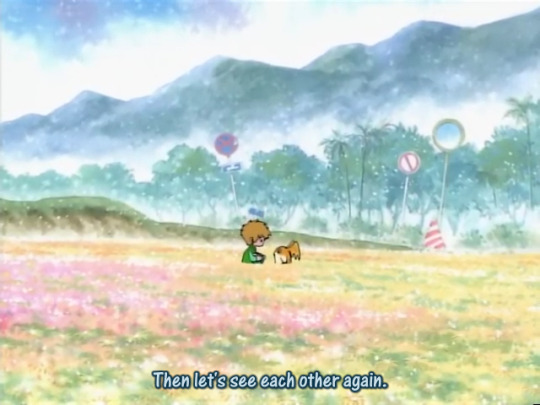
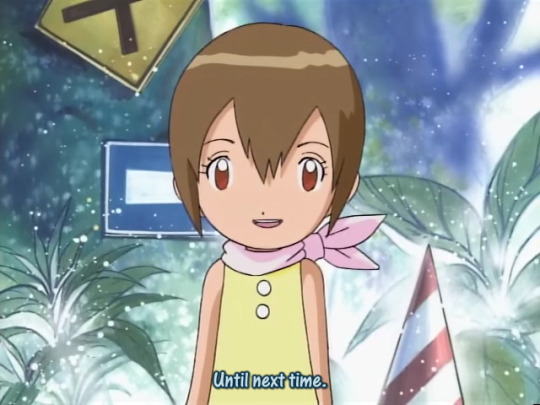
This is especially pretty apparent when you get to the last episode, where Takeru and Hikari are conspicuously the ones to leave off on the most confident “we’ll meet again” notes, compared to the other six. Of course, they do it in their own respective ways (Takeru and Patamon resolve to make it happen, while Hikari cryptically acts like it’s already bound to happen, borderline prophetically), and maybe you could chalk it up to the fact that they’re the youngest and therefore most naive of this group...but, again, remember: 02′s first episode aired one week after this one, where we would immediately be treated to Takeru and Hikari following up on this. Given that, you can basically see this as a wink and a nod: “yeah, these two have a story that’s not over yet.”
And as much as I may sound like a heathen to the fanbase by claiming this, I would actually say that it’s the opposite of the above claim: Takeru and Hikari both have pretty unresolved arcs by the end of Adventure compared to the rest of the other kids, and in fact are fleshed out more in 02. It’s honestly kind of a stretch to say that they “already got development” in Adventure -- Takeru still has a ton of unresolved issues with his family and trauma and emotional behavior that aren’t properly addressed to nearly the same degree as how the older kids have their core issues brought to the forefront, while Hikari really was only around for less than half the series, and not only is her main problem of emotional suppression told purely from Taichi’s mouth and not her own, we also get no real follow-up on how she intends to work past that.
Those are some pretty huge things to leave unresolved at the end of a series that’s known for its focus on individual character development, and considering that the premise of 02 involving an older Takeru and Hikari was likely finalized around the middle of the last arc of Adventure, it’s easy to believe that they decided to deliberately hold off on resolving Takeru and Hikari’s issues in full so that their story could be told in the next series. And, indeed, while their characters being built on “being difficult to read” makes their development not quite as visible as some of the more eccentric personalities in the 02 cast, their respective Jogress partners (Iori and Miyako) more openly discuss and get to the bottom of their issues that had been lightly displayed or hinted in Adventure but never truly been addressed.
A lot of things that were not in Adventure
Adventure was admittedly kind of written as they went along (they didn’t even originally plan to have Hikari as the eighth child at first), so it’s hard to tell exactly what was planned and what was a later addition (and at what point things were added), but considering that the 02 epilogue was one of the first things planned in the entire series, as part of “a story of humanity’s evolution” and tying into a really long theory about partners doubling every year, it’s probably at least safe to say that a lot of the worldbuilding and lore was determined very early.
02 added a lot of lore dumps about Digital World mechanics and things related to the overall state of Chosen Children, which have been said by many to be retrofits to justify a buildup to the 02 epilogue, but, again -- the 02 epilogue was supposed to be for Adventure, so it’s very likely that these lore aspects were intended for Adventure as well! This is especially because it’s been outright confirmed that there were at least certain things originally intended for Adventure that ended up in 02, or at least were in 02 because they felt Adventure didn’t sufficiently cover it:
The kids’ home lives. As famous as the Tokyo arc of Adventure is, it only covered about a quarter of it -- the rest of it was the kids stranded in another world, separated from home! It’s specifically 02 that went into all of the things like school life, family life, daily life in Odaiba, and everything closer to the real world -- basically, everything related to family backgrounds that was very likely to have been in the planning documents for Adventure but never made it.
The (in)famous 02 episode 13 (or, at least, something like it) was intended for Adventure. As much as there’s common speculation that this episode was intended to be some giant subplot that got canned, from what we’ve heard from the staff, the truth actually seems to be a lot more mundane -- Adventure was a series very big on “oddities about the Digital World that have no real explanation” (see: phone booths), and when you reframe it in Adventure’s context, it’s likely that Dagomon and the Dark Ocean were intended to be yet another of those as part of its wider lore about the multiverse, to make you think “the heck was that?” but never get any real answer to. (And while it’s unclear whether the original theoretical Adventure version of this episode would have still involved Takeru and Hikari, if you want to put a tinfoil hat on and entertain that theory, it lends even further credence to the idea that their respective character arcs were deliberately held off for 02...)
Given that, and thinking about the 02 epilogue as the eventual goal for the series, you can also easily imagine a lot of 02-introduced things leading up to it as probably also having been baked into Adventure’s lore:
You know how 02 had a subplot about Chosen Children proliferating all over the world, as a lead-up to everyone in the world eventually having a partner? This was part of a “doubling every year” formula that’s been referred to a few times in background staff testimony. If you inspect this formula, this means that there were eight other Chosen Children besides Taichi and his friends, chosen between 1995 and 1999. Now, remember how Adventure episode 52 briefly touched on the bombshell of Chosen Children existing before Taichi and co., before never addressing it again? Considering all of the above facts, it’s very likely that’s intended to tie into that formula -- and, perhaps, had 02 had not existed to continue the subplot about “more Chosen Children”, Adventure would have taken more initiative about explaining the concept of Taichi and his friends not being the only humans with partners, and led it into their originally intended epilogue.
02 episode 33 involves Miyako visiting Kyoto and learning that there may be certain similarities between Digimon and Japanese youkai, to the point where they might be related somehow, despite predating digital technology. (The concept is revisited in Mimi’s track in Two-and-a-Half Year Break and the Adventure BD drama CD, both of them having been written after 02.) The thing is, the idea that Digimon and other similar entities actually existed prior to digital technology, and that said technology only allowed it to manifest physically in the real world, also is heavily tied to the original concept of Digimon partners being a manifestation of a part of the human’s soul, and therefore having a partner being a part of human evolution -- which is, again, heavily tied to the original intent behind the epilogue. So it’s very likely that this, at the very least, was one of the original lore points behind Adventure -- and if 02 had not existed, it’s possible that Adventure might have tried to cover it as part of a lead-up to that epilogue, rather than ultimately deferring it to 02.
This is, of course, speculation -- I’m not a member of staff, so I can’t speak for them -- but I do think it’s important to consider that while 02 was a tonally different series, it wasn’t just a sequel tacked on at the last minute, and rather just (mostly) the same staff learning three-quarters of the way through that they would have more time to continue this narrative, and reorganizing things to figure out what they wanted to do now and what they wanted to touch on if they had more time. Really, this whole narrative of “02 being a bunch of random additions they came up with and retrofit” seems to almost be the opposite of what actually happened -- while some of the ideas behind 02 were certainly created later, it’s less that Adventure was some ideal perfectly crafted story and 02 an addendum, and more that they had so many things they wanted to do in Adventure that couldn’t fit and used 02 to vent more of those out:
One of the concepts behind the prior series was for us to pack in as many interesting things that we’d seen, heard about, or read about as we could into it, so for 02, we thought, what else could we put in beyond even that?, and so we looked over what we needed to have, and put in all the things we could so that they wouldn’t be left out, and the story became a multi-layered one, overlapping and accelerating. It was to the point that, after we’d gone through 02‘s story, the scriptwriters told me that they’d worn everything they had out to the ground. In any case, we put everything we had into it back then.
Which means that understanding 02 is actually very retroactively important to understanding Adventure -- Adventure’s own writing was influenced by the knowledge that 02 would be part of its story, and 02 itself carries a lot of vital facts and story points from Adventure’s narrative that didn’t fit in the first 54 episodes, and, in real life, they were both written continuously as one story over the course of over two years. It’s also because of this that I seriously warn against seeing either series in a vacuum too much -- because both series are very deeply tied to each other, perhaps more so than a lot of people want to admit.
140 notes
·
View notes
Text
Your Novel in Martial Arts
One of many top three Chinese fighting methods fiction copy writers, Gu Lengthy (1937-1985) wrote sixty-nine books in a job spanning mph years. Lots of copies in his catalogs have been bought, and many of them have been frequently adapted intended for TV or perhaps cinema. His other essential novels have the Compassionate Swordsman and the Merciless Sword (1970), The Orchid at Midnight (1979) and Search Hawk, Casino Game (1984). At the age of forty-eight, he past away of liver disease caused by high alcohol alcohol consumption. Rebecca Nasiums. Tai received her masters degree out of University of California, Los Angeles. She really likes reading excursion fiction and watching martial arts training drama.
One of his missions, Xiao (the Eleventh Son, referred to as Great Bandit) meets Shen, the fairest woman inside martial universe. By the are going to of destiny, he protects Shen repeatedly, which crops the seed of love through both of them. Nevertheless , Shen can be married to your rich son who is likewise an outstanding martial artist. Almost like things are not complicated more than enough, Xiao features his unique secret baver, Feng, a beautiful swordswoman along with a quick state of mind. Xiao is definitely drawn into a messy guard a popular saber, the Deer Carver, and is suspect of stealing it. Xiao finds out the fact that the person who has set him up is mostly a mysterious child with a great angel's experience and a fabulous devil's center. Before he can pursue any more, Shen's nanna is murdered, and Xiao is named the killer. It would appear that things are rotating out of control?
The following are some reviews made by a variety of foreign readers.
This book certainly is the only official translated wuxia novel in by the Delayed Gu Extended (Ku Extended, Ku lung) available in English language to date. Gu Long is among the three very best wuxia copy writers ever, therefore having a person his works of fiction finally being recognized is indeed wonderful. Whilst comparing that to additional translated wuxia novels happen to be rather unfair, because Gu Long provides his private distinct posting style, nevertheless in technical aspect of understanding, Becky Tai, the übersetzungsprogramm, exceeded the rest, mainly when compared John Minfor and Graham Earnshaw. Becky Tai preserved the writer's original posting style and mood, set up words and sentences have become in English tongue. Additionally , Becky kept the names and significant terms for Chinese pinyin and outlined them to her readers, a lot better approach as opposed to changing character's name inside English as well as ignorantly using the term "Karate" for Chinese language martial arts, like Minford did in his snel of The Deer and the Cauldron. Overall, this guide worths just about every penny and should be accumulated by anyone that love the "wuxia" (Chinese knight-errand) genre but unable to examine neither Far east characters nor any other Asian kitchenware language whereby many wuxia novels have already been translated.
In terms of I know, this is Gu Long's second world wide published in the West. The earliest was Christine Courniot's France translation of "Les Quatre Brigands du Huabei" obtainable from the amazon website. fr. This is the first professional and complete English language translation created by Rebecca Tai. Those of us, who have an interest through martial arts hype, seek out novels like this one however you do not have to be a martial arts admirateur to appreciate this excellent novel. Gu Long, much more than Louis Cha, has a poetic style of composing that is exceptional to the genre of Asian martial arts misinformation. I find the controls of his novels inviting and gorgeous which leaves a lot to the imagination. Gu Long has acute mental insight into human nature combined with the real human relational perception of honor and shame. The characters will be fascinating, the situations the particular characters result in are at moments fantastic nonetheless that is regular of literary works that involves history and fantasy. I extensively enjoyed that novel. It turned out a new and refreshing experience.
This is one of the first translated books from the credited Chinese martial arts training fiction compose Gu Prolonged. It's good translated and takes you back in its history to a mythological China thousands of years ago, the moment martial art and Chinese glimmering gems went in conjunction. The world Gu Long produces is romanticized with varied characters the two good and evil, all the things well versed inside martial arts. With https://cnovelholic.com/ , Xiao, Feng, and Shen are very believable and frequently humorous. This is exactly like a literary version from Crouching Tiger Hidden Monster, Hero, or maybe House from Flying Daggers. Kudos to Rebecca Tai for converting and Homa for providing a great Asian literary gemstone to the areas!
2 notes
·
View notes
Text
One of the aspects of Hordak that strikes me so significantly when compared to other characters is the unexpected, terrifying escalation of his situation.
We don’t really see this happen with anyone else: generally speaking, our other characters are very much a case of “what you see is what you get.” Adora is perhaps a bit of an exception, seeing as her status as “First Ones gun trigger” is used as a plot twist in season four, but her general background and the overall nature of her situation remain fairly consistent throughout the show.
Same with Catra. Same with Glimmer and Bow. Mermista, Perfuma, Scorpia, Frosta... everyone else receives a backstory and, barring minute elaborations, stays true to our first impressions of them. Our understanding of who they are and what they are about doesn’t really change.
Hordak is not this way.

Hordak starts off as a pretty standard, one-dimensional evil warlord character. Season one finds him very much delegated to the background, supposedly pulling the strings behind the scenes as other characters have their dramas play out center stage. He is well-designed and frightening, an imposing individual with a stoic personality and a sense of reason and logic that marks him as an effective commander.
We get no backstory at this point, and the initial impression of the character (at least for me) is “capable evil leader, little to no depth beyond what is absolutely necessary.” And that’s fine. At this point in the story, there’s no suggestion that Hordak will have any sort of role save for serving as an ultimate antagonist for our heroes, so a backstory is largely unnecessary. He appears properly built to provide powerful opposition, and that’s all we need.
This is Hordak’s starting point. It is a serviceable starting point. It is also stunningly different from his end point, and at this stage in the series, there is zero indication that there is going to be any alteration, let alone such a dramatic one.
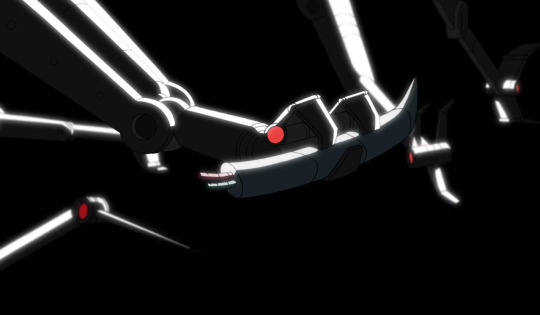
Seasons two and three see Hordak gaining actual development. Significant development. Development that provides him with a painful, sympathetic reason for waging his war. Suddenly, Hordak is not an all-powerful, untouchable warlord. Suddenly, he is a vulnerable individual with significant physical ailments and resulting emotional trauma.
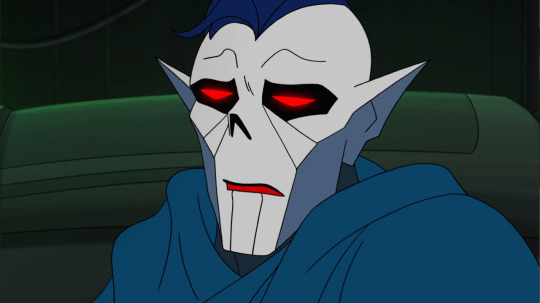
His situation has escalated.
We see now that his body is falling apart, that he is sickly and weak and dependent upon armor and bravado to maintain control over his subordinates. We see that he is not the stoic, omnipotent man presented to us in season one.
Instead, we learn that he is a manufactured clone with deep emotional wounds linked to past rejection and trauma, that he comes from a society where his illness is scorned enough to earn him rejection and what amounts to a death sentence. We come to understand that he views himself very poorly, and that a significant number of his negative character traits are rooted in shame and fear and a desperate need for validation.
we also learn that he has cute lil ears that can wiggle and droop when he’s sad

To these significant developments we add his budding friendship with Entrapta, and we find that Hordak is very much capable of desiring, forming, and maintaining a positive, affectionate relationship with someone. His character thus becomes even more complex.
Now, something to keep in mind at this point: thanks to revelations provided by his backstory, we can view Hordak as a more vulnerable individual with legitimate feelings and insecurities. That said, there is still a certain dangerous edge to him. At this point in the series, we have been told, by Hordak himself, that he was a top general in a much larger version of the Horde.
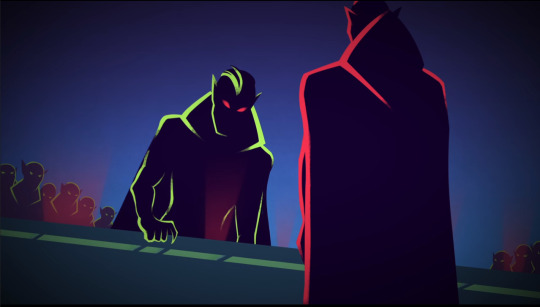
This supposed fact somewhat tempers his vulnerability. We get the sense that, while he is suffering from the shame and subsequent rejection brought on by his disability, his ultimate goal of rejoining his brother still involves a certain level of power. There is this idea that, though he wants validation and acceptance, he is also seeking to regain a position that, theoretically, grants him greater power and authority than the one he holds now. Hence why he doesn’t just settle for conquering and ruling Etheria: being lord of Etheria does not hold a candle to the power granted him by regaining his rank as Horde Prime’s top general.
One can look back at the fandom during late 2019 to fully appreciate this: fanfiction from this time period often features headcanons of particularly accomplished clones holding respected positions in Prime’s empire. High ranking clones have names and titles. They have ships. They have their own planets and their own armies. Even though they serve Prime and are, sadly, purpose-bred clones, they have power and status that provide them with a certain level of agency.
Essentially, there was the idea that a traditional Horde military structure exists, and Hordak held privilege within it.
So, while Hordak’s situation has escalated in emotional poignancy from “evil warlord wanting to rule the world” to “defective clone seeking validation,” there remains an unsympathetic aspect to it. There is still some degree of potential power-hunger that one can attribute to him.
This changes, very suddenly and traumatically, in seasons four and five. And this, friends and neighbors, is where I begin to become very emotional.

Our first indication that things are about to wildly change comes during the season four finale. We meet Horde Prime. We see how submissive and terrified Hordak is in his presence. We witness Prime’s distaste not only for the state of him and his failed conquest, but for Hordak daring to take a name.

It is Hordak’s name being a problem that plants the seeds for an upheaval of our preconceived notions regarding a clone’s function in the Galactic Horde. Those seeds germinate abruptly and violently in the next few moments as Prime lifts Hordak by the throat, declares him an abomination, and viciously violates and erases his mind.
And oh, friends and neighbors, now we know that something is wrong.
We don’t quite know the specifics yet, but we know that there is some sort of discrepancy between what Hordak told us and the truth he has lived. At no point in the narrative did Hordak say anything about names being inappropriate. At no point did he say anything that might have prepared us for the suspiciously religiously-coded language Prime is using. At no point did he say anything to suggest that there was anything wrong with what he was doing beyond trying to compensate for a physical disability.
And then, alongside all of these dark little surprises, there are the hauntingly blank stares of the clones standing besides Prime’s throne.
All of these factors instill a sense of dread that culminates in the chilling reveal of the Galactic Horde’s true nature come season five.
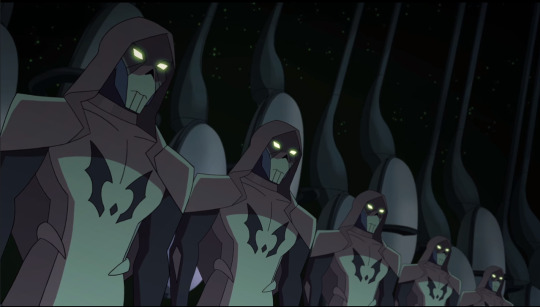
It is a cult. An honest-to-the-gods, played-absolutely-straight religious cult.
The Galactic Horde isn’t a traditional army, or an aggressive nation, or even a standard imperialist empire. It is a cult, with Horde Prime as its god and countless clone acolytes acting as its horrifically willing members.
We never see a top general, or any generals at all. We never see any sort of military hierarchy. We never see clones leading armies, or owning ships, or holding ranks, or commanding anyone or anything.
What we see instead is clones blindly worshiping their Brother. We see them doting on him, sacrificing their own life force to maintain his form. We see them forfeiting control of their bodies to him whenever he feels like using another’s form. We see them chanting the virtue of suffering to achieve purity. We see them blank and emotionless save for religious zealotry, a purpose-bred cohort of completely brainwashed followers. We see that there is no apparent escape from this life, for Prime sees their minds and controls every aspect of their existence, and we see that there is no desire for escape among them, so utterly indoctrinated are they.

We see Hordak reduced to one of these cowl-wearing acolytes: nameless, powerless, ready and willing to endure physical agony in order to forget his shame and relinquish his self to his Brother in the hopes of... well, certainly not of regaining some exalted military rank, or of reclaiming some previously-held status. These things do not exist. Not in this actual religious cult.
Hordak’s true situation is now fully apparent, and it is so far removed from our views of him back in previous seasons: rather than being a calculating warlord, or even a defective clone seeking to regain military glory, Hordak is a manufactured soldier-slave who was born into a religious cult, so indoctrinated and bound to his Brother that he risks his own life in order to win Prime’s love and approval.
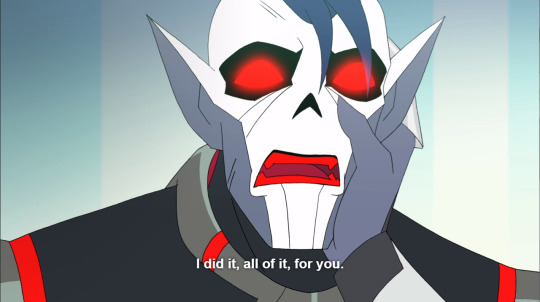
Because that’s what this final realization confirms: Hordak was never after any sort of power or prestigious military status. They never existed. Hordak was, in the end, an abused slave trying desperately to win love from his loveless master. He truly was just after validation and affection and a feeling of secure belonging. All things that he was deprived of because he was born a slave-acolyte in a godsforsaken cult.
And that’s... that’s such a vastly different state of affairs than the one we accepted in season one. It completely rewrites our understanding of Hordak’s power, of his vulnerability, of his true wants and needs and desires. Said understanding shifts from a purely villainous one to one steeped in self-loathing and control and lifelong victimization. It is absolutely shocking to see a character’s circumstances completely transform the way Hordak’s do between the show’s beginning and its finale. It is utterly bewildering to witness this intensity of change.
As I stated at the start: this doesn’t happen to anyone else. Oh, other characters develop and grow and undergo their arcs, sure, but by and large, Catra remains a scrappy catgirl. Adora remains an orphaned heroine. Swift Wind remains a revolutionary winged steed.
Only Hordak undergoes a transformation as dramatic as shifting from “all-powerful conquering warlord” to “defective clone seeking validation... but maybe also galactic power” before finally settling, tearfully and painfully, on “shamed, love-starved cult victim.” Only his situation, his true identity and our understanding of it, escalate so shockingly and to such terrifying levels.
I’m still not over it. I still cry about it. I still feel light-headed sometimes, knowing that Hordak's circumstances revolve around being born into and abused and thrown away by an actual cult. Even though we're over two months out from SPoP's finale, it's still that emotionally powerful to me, and the shock of the difference between seasons one and five only make it more so.
416 notes
·
View notes
Text
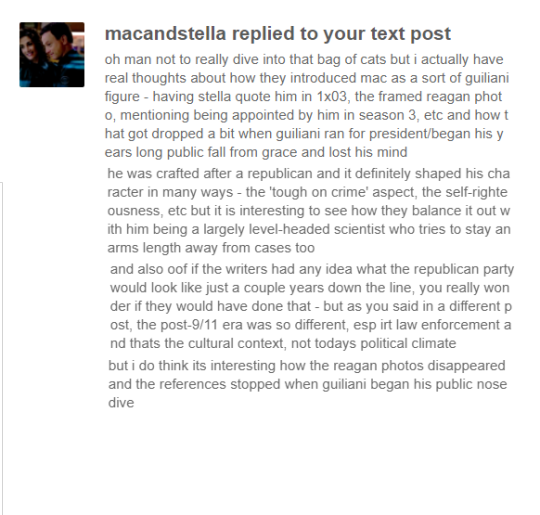
@macandstella
hi and welcome to my ted talk about csi ny and what makes it different than the other shows in the franchise.
the first being gary sinise. he had a huge amount of influence over the show and it’s direction from the beginning. he had a significant hand in creating mac taylor as a character from the ground up. he was the get for the executives at cbs. people don’t know how quickly gary became a producer on the show. he was an uncredited producer as of 1x11 tri-borough and the rest of season 1 and it wasn’t until season 2 that it was credited. sinise’s conservative politics were also baked into mac taylor but also his musical talent and his activism for the troops influenced mac’s military service. but definitely the conservative politics. and you’re right that there is definitely something of giuliani in the character before he went batshit insane.
i also believe there’s a lot going on in mac’s interactions with sinclair later in the series. especially season 3 during the clay dobson arc and than in season 5 with the ann steele thumb drive arc.
(side note: gary also provided the narration to captain amerca’s exhibit in winter solider)
but it should be noted that gary wasn’t the only one who had influence on his character. melina made stella greek. danny had carmine’s short lived baseball career ended by injury. actors usually do end up influencing their characters to a degree.
i also think john dove had a pretty significant influence in the writer’s room and as a producer. john appeared on screen as detective scagnetti as well. but he was a nypd veteran and gave input on a lot of things. he pops up a lot on special features on the dvd sets.
i wish i knew more about pam veasey’s perspective to include her because she was so heavily involved with the show in practically every aspect and i don’t want to implicate otherwise.
of course, 9/11 is a foundational part of csi ny because obviously the show takes place in new york itself but also because mac’s wife claire was killed on 9/11. the trauma of 9/11 not just the political fallout is there throughout the entire show. if i remember right zuiker even talks about at the end of his commentary on blink how csi ny was the first show permitted to film at ground zero.
there’s also the sordid history of the nypd that sort of looms quietly in the background. vegas and miami were basically unknowns to the public at large. the nypd on the other hand is famous but also infamous. by and large this show is copaganda. they are the heroes of the stories. solving crime by dinner time like they’re mary-kate and ashley olsen while also often having questionable interpretations of the 4th amendment. because this was around the time of the patriot act, the invasion of afghanistan and the bush administration lying it’s ass off about iraq.
it’s so interesting to think about the behind the scenes aspects of the show and see how the final product comes out.
i also think these shows started to come to end as society shifted at large and the causal viewer could no longer ignore what police as an institution had become. vegas got away with it longer because they were scientists first but on ny they were explicitly cops. the last episode of the show is --- something.
(**i refuse to include anthony zuiker’s weird ass fetishes being an influence but just watch the suicide girls episode and you will understand. i wish i could unhear the commentary)
7 notes
·
View notes
Photo
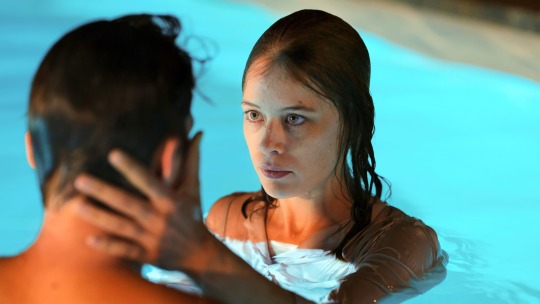
Siren Song.
Undine writer-director Christian Petzold talks to Reyzando Nawara about modern-day mermaids, Tinder culture and finding the magic in life.
“Love stories always change. A kiss in Berlin 1933, for example, is not gonna be the same kiss in Berlin today, right?” —Christian Petzold
“If you leave me, then I’ll have to kill you.” Undine’s threat to her soon-to-be ex-boyfriend Johannes, after he has told her that he has met someone else, seems at first like an over-the-top reaction to the breakup. But it is a curse that Undine must fulfill, for she will become human only when she falls in love with a man who is doomed to die if he is unfaithful to her.
From Splash to Ponyo to The Lure to Song of the Sea, mythical water spirits, usually female, sometimes horse, have powered many film plots. The sixteenth-century European myth of Undine, in particular, lies behind many screen adaptations of Hans Christian Andersen’s The Little Mermaid, though the Danish writer was not the first to popularize the fairytale in his century. Decades earlier, around 1811, Friedrich de la Motte Fouqué of Germany had produced his romantic novella, Undine.
And it is to Germany—specifically modern-day Berlin—that writer-director (and fellow German) Christian Petzold transports Undine in his contemporary magical-realist take on the myth. There, she does not take the form of a mermaid or siren, but a beautiful young woman (played by Paula Beer), who works as a historian at a museum, where she guides tours of Berlin’s architecture and its reconstruction. The breathtaking cinematography, by regular Petzold collaborator Hans Fromm, crystallizes both the romance and the beauty of Berlin, while Petzold’s leads root every scene in reality, even as aquariums explode and giant catfish drift past.
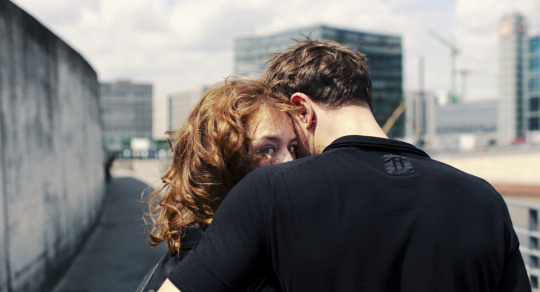
Paula Beer and Franz Rogowski fire up the streets of Berlin in ‘Undine’.
Water may be the dominant element in Undine, but Beer and her co-star Franz Rogowski bring fire to their scenes together. Where Beer brings charisma and intensity to the titular role, Rogowski, as Undine’s new love interest, an industrial diver named Christoph, offers charm and sweetness.
In the frenzy of Parasite’s world domination, it is easy to forget that Petzold’s previous feature, Transit, appeared in two of our 2019 Year in Review lists—the 50 highest-rated films and the highest-rated international films—and was one of the top romance films of the 2010s. His riveting Phoenix is still his highest-rated film on the platform—one of many to center a complex female character in search of love at a time of personal and/or political crisis. In Undine, Petzold does it again, a welcome departure from other adaptations, including the Colin Farrell-starring Irish romantic drama Ondine (2009), that have mostly told the myth from the perspective of its male characters. Petzold also revises the fairytale, by giving Undine a chance to try to emancipate herself from her curse.
We recently had the pleasure of speaking with Petzold about his fascination with water, the magic of Berlin history, modern dating and of course, his ongoing collaboration with Beer and Rogowski.
Spoiler warning: this conversation contains plot details regarding the ending of Petzold’s film ‘Transit’ (2018).
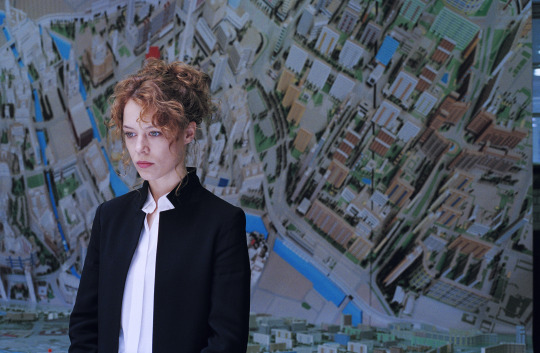
Your movie is inspired by the myth of Undine, but you reinvent it by giving it some modern twists. How did the main narrative for the film come about?
Christian Petzold: I think the idea of the story first came to me around twenty years ago when I had a project in Germany. It was together with Claire Denis and also Kathryn Bigelow, and everybody had to make a ten-minute short film for a project based on the museum near the Rhine River. I had written a little dialogue—oh, by the way, Steve McQueen was also part of the project—and it was the scene that we can see in the movie in the first few minutes where Undine’s boyfriend, Johannes, said that he doesn’t love her anymore and that he wants to leave her and she said to him, “If you leave me, then I’ll have to kill you.” Then she goes back to work, and later when she comes back to try to find him again, he isn’t there—so she knows that she has to kill him now.
Then when I made Transit with Paula Beer and Franz Rogowski, I told them after a very lucky and happy time of shooting, that I had written a short story and wanted to make a 90-minute feature movie out of it together with them. I wanted to keep working and making movies with them because we’ve had an amazing experience together in Transit. This was basically the start of how the movie and my collaboration with these two actors came about.
Paula and Franz are actors who didn’t come from the basic German acting school; their backgrounds are dance and theater. But they both have so much curiosity about cinema—when I met Paula for the first time, for example, she told me that she had bought 50 movies by Alfred Hitchcock and wanted to see all of them, and to me, this is the best kind of school to learn about cinema.
So to some extent, Undine is a spiritual sequel to Transit?
Yes, you’re right. It has so many things to do with Transit. Marie, Paula’s character in Transit, finds her own death in the sea—she’s drowned. And Franz’s character, he’s waiting at the land, hoping that she may come back from the land of the dead. So I said to them, “Okay, the next movie is gonna be about a woman coming out of the sea and going to the land to search for love and also about this young man who is a diver, who is going underwater, to find love as well.” So to some degree, it’s a sequel, you’re right.
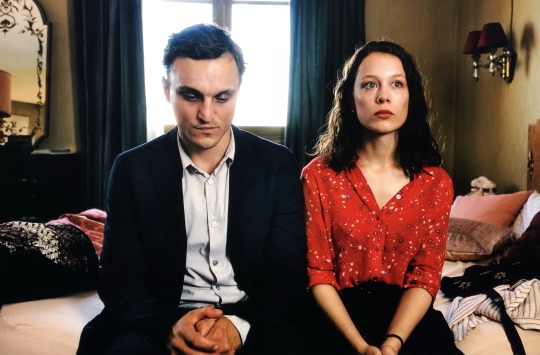
Beer and Ragowski in ‘Transit’ (2018).
You mentioned earlier that you had a great experience working with Paula and Franz in Transit. Can you tell us what it was about these two actors that you thought would capture the story you wanted to tell in Undine?
Paula is a very young actor—she was 23 when we started Transit, and she was around 24 when we made Undine—but when you’re filming her, she has this ability to make her characters much more mature beyond her real age. In one second, she’s 45 years old, with a whole experience of someone who’s had a hard life and has gone through so many bad things, then one second later, she’s thirteen and innocent. And to have that kind of ability—to go from one point to another—is just really fascinating to me. I’ve never seen other actors do this before in my life.
Franz was a dancer, and if I remember correctly, I think he was also in a clown school for a circus, so he can do everything with his body. It’s unbelievable what he can do. He has this amazing physicality that I admire and haven’t seen before in other German actors. When they’re together sharing a scene, they dance with each other. And this is the thing that I like so much about them and the thing I need in Undine, because I need actors who can float from one scene to another as if they’re dancing underwater.
In literature and pop culture, the myth of Undine has been mostly told from the male perspective. You reframe the narrative, to give Undine the opportunity to maybe emancipate herself from both the male figure in her life and the curse. Tell me more about that choice.
Two or three years ago, I had a retrospective in New York, and I had the chance to see some of my previous movies again—[laughing] I’ve actually never done it before, revisiting my own movies. And at that time, I realized that I’ve always tried to rewrite the stories centering on women, which were made by men in the ’40s, ’50s, ’60s and ’70s, from another perspective: the perspective of the women.
When I was in Venice for the first time, Claude Chabrol [was] in the same hotel as me, and he had a Q&A. I wanted to say hi and tell him how great he was but I couldn’t do it because I was very young and too shy for those things. I heard what he said when asked why in his movies, the women are always the main characters. His answer was, “Men are living, women are surviving. And cinema is about surviving.” It was such a fantastic answer.
All the movies I [have] made, including Undine, are about surviving. Undine wanted to survive her curse—she tries to, every time, since centuries ago. In so many iterations of the myth, Undine always has to go back into the lake and to the life the curse has set for her. I really wanted to zoom in on that, to liberate the character of Undine from the myth and the curse.
In the movie, Undine works as an historian at a museum, and in her tours, she talks about Berlin’s architecture and its reconstruction throughout the years. How is this related to the romantic aspect of the movie?
Everybody says you can take a love story and put it in the sixteenth century or the nineteenth century, and it’s always gonna be the same kind of love story. But I think that’s not entirely right. Love stories always change. A kiss in Berlin 1933, for example, is not gonna be the same kiss in Berlin today, right? Therefore I want to take the historical aspect of Berlin architecture and its reconstruction to tell the story of two young people in Berlin nowadays, to see the evolution of both this love story and the myth of Undine itself.
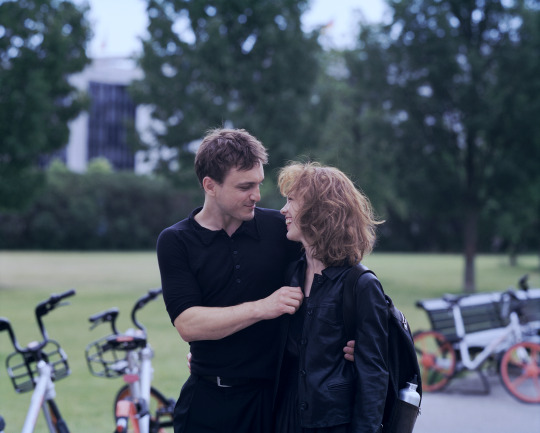
What’s the significance of all the buildings Undine mentions in the movie?
The buildings serve a very important role in the movie because Berlin is between two rivers on an island, and the city is built on dried-out swamps, so the element that Undine is coming from, which is the water, is destroyed in Berlin. It doesn’t exist anymore. And therefore Undine doesn’t have any habitats, so she has no choice but to adapt and to live on the land.
In some way, I always think that the modernization in Berlin erases history, and when there’s no history, there’s no magic, which means magical creatures like Undine won’t exist. That was the main idea of the architectural elements in the movie.
Is that also the reason why there are two locations in the movie: Berlin, and the small town where Franz’s character, Christoph, works and lives, which is still full of swamps? To show that in this small town, magic still exists?
That’s a good question. The romance and the myth of Undine is a part of German and European history. It’s a unique enchantment. But in Berlin, where modernization and civilization keep growing and changing, there’s no enchantment anymore. So I want to show how in this small town where everything is still kept as closely natural as possible, the enchantment and the charm of Germany are still there.
There’s a beautiful and romantic poem by Joseph Eichendorff that says, “You must find the right world, so everything can sync again.” To me, that line encourages us to find the magic of the world back. We live in this world surrounded by retro buildings and retro behavior and retro music, but it’s all actually just an illusion of magic. The real magic, that’s something that we have to find—either by movies or camera positions or poems or even by preserving the naturality of a city. And the Undine myth actually has a lot to do with this.
Another thing that fascinates me about the movie is how the dynamic between Undine and Johannes, in some way, reflects the state of modern dating. Is this something that you also wanted to capture when you wrote the script?
[Laughing] Funny story, when Paula read the script for the first time, she told me that she liked it so much because the story reminded her of Tinder and modern dating. And on some level, it’s true; part of Undine is about modern dating. I always think that in the era of dating apps, everything gets much simpler—you meet someone, you have sex (or perhaps not), and if you feel like this someone is not handsome or beautiful enough for you, you can keep scrolling until you find someone new. So, dating right now is like going to the supermarket.
Johannes leaving Undine to be with another woman, who for him is better-looking than Undine, reflects the culture of Tinder. And the line I mentioned earlier, “If you leave me, then I’ll have to kill you,” is the opposite of that kind of dating life. And Paula, who hates Tinder, loves that line a lot. Some of the actors are on Tinder, I’m sure, and that’s understandable. Actors are sometimes very lonely because for six to eight weeks, they are deep inside of a character, and when they’re on break, they’re in some sort of “black hole of loneliness”.
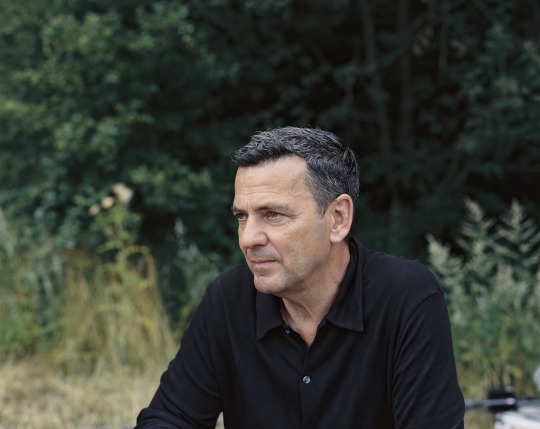
Writer-director Christian Petzold.
Undine being a water nymph, of course, makes the water element very important in this movie. But water has actually been heavily featured in some of your previous features as well, like in Yella, Barbara and Transit. Can you tell us why you find water fascinating?
I’ve seen a documentary by Agnès Varda, and in [it] she said, “The place where one element is touching one another is the place where cinema builds its stories.” That’s why she loved the beach, because on the beach, there’s water and there’s the earth and there’s also wind, and they’re touching each other. So to her, the beach is the perfect place where you can tell a story.
For me, however, the reason I like featuring water or the other elements in most of my movies is because it has something to do with seeing my characters coming from one element then going to the other elements; to see them act and react in a new and sometimes uncomfortable place. Also, when you see pictures or paintings, so many of them are about people looking deep into the sea. I always feel like that kind of painting is actually about a desire. And most of my movies, at [their] core, are about desire. That’s why water is so important to me. Deep under the water, there’s the place of desire.
What’s the first movie that made you want to become a filmmaker?
The first movie I loved very much as a kid was The Jungle Book, but the first movie that made me want to become a filmmaker was by Alfred Hitchcock, The 39 Steps. I was fourteen or fifteen years old when I saw the movie for the first time, and I loved it from the first moment. The movie is about a man and a woman who are bound by handcuffs, and they don’t like each other, but because they’re on the run, they have to communicate and come to an understanding. And the love story starts because of that communication, not because of looks, and I love the movie so much for that reason.
If you could program a double feature with Undine, what movie would you pick?
Good question. I would say The Night of the Hunter. Also maybe Creature from the Black Lagoon or 20,000 Leagues Under the Sea or The Son’s Room by Nanni Moretti. These are the movies that I would recommend for a double feature with Undine.
Related content
More ‘Little Mermaid’ adaptations: a list by Katherine
Paula Beer strolling around towns cinematic universe
Diogo’s mega-list of Mermaids in Film
Horror’s History with Scary Mermaids: a Bloody Disgusting list
Follow Reyzando on Letterboxd
‘Undine’ is in theaters and available on VOD in the US now.
#christian petzold#paula beer#transit film#undine#undine myth#ondine#water nymph#mermaids#mermaid film#german film#german director#german screenwriter#german cinema#cinema germany#romance#romance films#Reyzando Nawara#franz rogowski#letterboxd#filmmaker#letterboxd interview
24 notes
·
View notes
Text
The flashbacks in Prodigal Son 2x03 were, in my opinion, a major puzzle piece of Malcolm’s past that we didn’t even know we were missing. I think they were hugely significant. Or they should be.
Malcolm being attacked in that way is potentially one of the most overtly traumatic experiences we’ve seen in Malcolm’s childhood. It really stands out among the things we’ve seen and heard about from his childhood. Up until this point Malcolm’s trauma has all been a bit more abstract. The grooming from his father. The fallout from his father’s crimes being revealed, and the way that changed how Malcolm was viewed. His own fears pertaining to his how he might be like Martin, and fear of Martin directly. Finding the body. Even being chloroformed by Martin fits more in this general category.
But this incident is distinctly different. First of all, this is the most significant trauma not directly from Martin; Martin is indirectly the cause, but there is a much more present, much more direct perpetrator, and that’s unique. Secondly, this is the first trauma that directly, and maliciously targets Malcolm. Most of what Malcolm has dealt with is the result of just being within the fallout zone from Martin’s actions. Even the ones that are more focused on him-- Martin’s grooming and the chloroform-- have a different character because there’s no explicit malice (they certainly did harm Malcolm, but that was not Martin’s mindset in doing them). Third, there’s a greater degree of specific fear in the particular moment. Most of the flashbacks we’ve seen with the child actor don’t necessarily show Malcolm being afraid (even though fear is a big thing for Malcolm). With a lot of those aspects, it seems like it was more a creeping fear after the fact, as he realized more and more about who his father was and what had been going on with him and around him. So it wasn’t concentrated in one moment but was spread out over everything, sort of a spreading infection that worked its way into every aspect of his life over time. And that fear is somewhat abstract or even existential a lot of the time. (this point might have the exception of the moment when he find the girl in the box). Which is quite different from the experience in the 2x03 flashback, where there is a present intense fear for his life. Fourth, this is the only one which caused Malcolm physical harm (the chloroform had the potential to, but the main way it seems to have affected Malcolm was through the role it played in gaslighting him, and through the realization during season 1 of how Martin treated him and what that meant for the relationship). This one however, physically trapped Malcolm and led to him being denied food and water for three days.
(Note: I’ve excluded the events with Watkins at the cabin from this discussion, primarily because Malcolm had so thoroughly repressed those memories)
None of this is to say that the closet incident was worse than what Martin did, or that it affected Malcolm more, just that this incident has a very different character, so it can’t be written off as just another episode in a long run.
But I do think there’s a strong argument to be made that this event did have a major effect on Malcolm. It is so different and so extreme that I don’t see how it could not. According to this episode, we do know that this is the origin of his hand tremor (I know this conflicts with an earlier flashback, but I’m going to accept the retcon). However, the way the episode was framed it almost felt like they were treating this as just some random bit of backstory. So I really hope that they do revisit this idea and incorporate it more into our understanding of Malcolm and why he is who he is.
There’s already one more conclusion that I think can be reasonably drawn. While this incident stands out really starkly against Malcolm’s childhood trauma, it doesn’t stand out against his adult trauma. In the present, things of this nature-- Malcolm being targeted, Malcolm being hurt, Malcolm’s life being in danger-- are very common. Very common. Practically a weekly occurrence.
And it’s very clear that Malcolm’s response to these weekly brushes with death is not appropriately scaled. The end of 2x03 even demonstrated this. Malcolm risks his life. Malcolm gets hurt. And Malcolm shrugs it off and tries to disregard it.
Maybe the root of that lies in this high school experience. The timeframe isn’t clear but it appears as if Malcolm is back at the school (WITH the student who did this) within the week. That could be Jessica pushing him to maintain appearances, that could be the school’s doing, or that could be a choice made by Malcolm himself, but regardless, that is hardly any time given for him to recover either physically or emotionally. Which becomes characteristic of Malcolm. Furthermore, when Malcolm retaliates (and of course I am not condoning his little foray into attempted murder) he is the one who is punished. Malcolm is expelled, but we are not told that the same happened to the student who locked him in the closet in the first place. It could be that Malcolm refused to identify who trapped him (because he wanted to take action himself) and that’s the reason we don’t hear about him facing consequences. It could be that for whatever reason, there were no significant consequences for that boy. Or it could be that he did get expelled (or face other consequences) and the narrative, framed as a component of Malcolm’s memory, did not include that detail.
With any of these explanations, a pattern is established that frames Malcolm’s perception. Malcolm is hurt. Malcolm’s actions to protect or avenge himself are bad and punishable. Malcolm’s attacker either faces no consequences, or those consequences are deemed unimportant.
Now, again, of course it would not be right for Malcolm to murder the student who trapped him. But I think the extremity of that reaction informs why this pattern seems to have held. Malcolm is so afraid of his capability to be like Martin-- to kill-- that he struggles to draw a distinction between justified self defense/reaction and vengeful retaliation. He fears the latter so he hesitates to pursue the former.
So it seems that this particular incident in high school is what began to unduly acclimatize Malcolm to violence against himself and fear of death. And it at least planted the idea in his mind (or watered it) that he should be extremely distrustful of any of his own attempts to protect himself, and that it doesn’t matter whether his attacker faces repercussions or not.
Whether he expressed it and understood it explicitly or not, Malcolm’s takeaway from the experience seems to have been that there is some element of his father in him and that others will innately recognize it and try to punish it (attributing this to both the headmaster and the other student) and that as much as he might hate them for it, he feels limited in how much he can actually blame them for it. Because on some level he sees them as justified in whatever they do to him. In fact, the only one he feels he can consistently blame for actions against himself, is Martin, because while others are punishing him for the “evil” he inherited from Martin, Martin is the one to blame ultimately for it being there.
40 notes
·
View notes
Text
ancient language hcs
((I’ve been thinking of doing this ever since it was mentioned in a thread, and I realized I’ve never really thought that much about what the Ancient Language (abbreviated AL) was supposed to be like, spoken. The soundtrack for the Galdr of Rebirth renders it as backwards Japanese, and I will take that into account, but I also have some thoughts of my own! My thoughts are also ridiculously long so have a read more cut:
First, according to the FE Wiki:
The ancient language was first devised by the beorc of Tellius, and for a time saw wide use among all of the land's people. However, its complexity proved to be a significant obstacle for it to be learned by laguz, and so the modern "Tellius language" was created and soon supplanted it as the continent's dominant tongue.
So the Ancient Language is supposedly ‘complex’. However, it is also the language the Galdrar are sung in, which means bird anatomy alone is capable of making the full range of these sounds. Thus, I propose that the AL has these following qualities, when compared to the Modern Tongue:
Phonetics: The production of sound (phones) in AL is, as stated above, extremely simple, allowing for its production by the tongues of multiple different types of animals. ‘Backwards Japanese’ is actually quite simple to pronounce, since like forwards Japanese, a lot of their words end on vowels, but I did wonder if the glides or fricatives wouldn’t be too much for them, so I looked up a bird utterances paper online, to which I found that the sounds available to them in song are probably slightly different from the sounds available to them in speech. There are probably some replacements when they sing, but at the same time they are Magical Birbs (TM) so their range of available sounds could well be much larger than your garden-variety bird. Do keep in mind that other species also use AL, and I did not go and look up a ‘wolf utterances paper’, so my hc does not take into account the other Laguz :’D Also related, I do firmly believe that speaking MT is not feasible to them in their Laguz form; for stuff like battle cutscenes, regardless of what the graphics render, I think they talk first, and then transform to fight.
Phonology: Tonal changes, differing stress and syllable onset all play a large part in differentiating the subtle intent behind words, at least in the spoken language! In song, that’s often replaced by vowel shifts, some of which do not naturally occur in speech, so it’s a music-only feature of the language, which might have something to do with seid magic. If you disregard all the subtle phonology changes, you’ll get the general gist of what they’re saying, but miss a whole load of nuances behind it, similar to, say, the way sarcasm is used in MT.
Morphology: The absolute bulk of AL’s ‘complexity’ stem from morphology! Every single word is tagged with all the information, including but not limited to: tense, aspect, mood, gender, case, number, and even things like ‘relative degree’, ‘relative status between speaker and listener’, or ‘special emphasis’ and the like. Perhaps there used to be more variance, or maybe there still is for other ‘dialects’ of AL (will the Herons and the Wolves really speak the exact same language after being separated for centuries? Unlikely), but at least the Herons’ version of AL is extremely ordered (get it?), and there is basically no irregularity in the application of morphemes. Learn all the intricate rules exactly once, and you’re all set for life, but there are a lot of rules. It’s interesting that the wiki mentioned it was more complex for Laguz - later on I think it’s said that, however, eventually the Laguz’ long lifespans allowed them to master the language better.
Syntax: Think Latin, but even freer than that, since there is no such thing as emphasis through position and everything is indicated in tones and by the morphology. Any word can go anywhere in the sentence and it’ll make perfect sense and mean exactly what you want it to mean, which is great for these birb singers! Very few headaches about how to fit lyrics to make sense :’D This, however, is the main reason Leanne pauses so much when speaking MT! She knows her grammatical options are severely more limited there than in AL, so she needs to think about how the sentence is supposed to be structured before she says it. And while I am biased towards making her replies actually make sense to the other person, she probably does make weird grammatical mistakes every so often.
Vocabulary/Semantics: This is probably the part I’ve mentioned the most in posts already, but AL has a relatively small pool of vocabulary, with differences in nuance indicated mainly by morphology and tone. For instance, ‘walk’ and ‘run’ would be two different words, but ‘jog’, ‘run’ and ‘sprint’ would be the same word with a slightly different indicator for ‘relative speed’. I actually have not consciously taken to doing this (yet), but in practice, Leanne, as an unexperienced speaker who still thinks mostly in terms of AL, would tend to prefer using simple words with additional adjectives/adverbs (e.g. ‘run fast’ or ‘run slow’ instead of ‘sprint’ or ‘jog’) when speaking MT.
Pragmatics: If you have a good grasp of the phonology and morphology and what they entail, you’ll generally understand what the person is trying to say, but if not, then a lot of their conversations will appear to not follow any known rules of conversation at all. As AL is a very old language, I figure a lot of the pragmatics side has strong ties to basic instincts and body language, which animals are often better at reading than humans are, so a lot of that plays into AL conversation as well!
Ok, but then why can Leanne understand everything but not speak well? As I mentioned before in the hcs channel on discord, I hc that Bird Laguz are born in their bird form, before going through Laguz Puberty at a later age, whereby they gain and are then locked into their humanoid forms as their default form. This, for Leanne, probably happened during her time asleep in the forest, so she was a baby bird for her entire time alive before the Serenes Massacre, which happened when she was about 2.5 years old in equivalent Beorc age, since Reyson calls her an ‘infant’ during that time. Now, 2.5-year-olds don’t normally understand everything you tell them! However, and this actually is a gripe I have with a lot of long-lived characters with a long infancy period, this is really not the same as a human situation. I briefly looked this up, and a baby who is considered ‘spoken to a lot’ might hear about 15,000 words a day. For Leanne, who had 6 siblings and 2 parents and a whole forest of other playmates, I might even think she’ll have heard more, but some of that was AL so probably about 15,000 words of MT a day sounds about right. But unlike a 2.5-year-old human baby, she’s been getting that for a whole entire 47 years. That means, before she even has the capability to speak a single word of MT, she’s already heard way more words spoken at her than the average adult Beorc, certainly more than one of her mental age of 18. Thus, while she’s still struggling to learn to produce the language, listening is usually no problem to her, unless the interlocutor in question speaks very quickly, or uses unfamiliar figures of speech / very difficult vocabulary! Like, Leanne probably won’t get anywhere talking with Awakening’s Miriel, but she can probably understand any average speaker just fine.
TL;DR because this is really long: the ‘complexity’ of AL is mainly in its vastly intricate phonology and morphology, which also results in a rich and confusing-to-outsiders system of pragmatics, while phonetics and vocabulary are very simple, and syntax is basically nonexistent. Certainly a very different kind of language from MT, which is why Leanne struggles when speaking, despite being receptively fluent!))
#♪ an imaginary forest (hcs)#there's a tldr at the bottom of this ridic text wall :'D#♪ conductor's baton (ooc)
8 notes
·
View notes